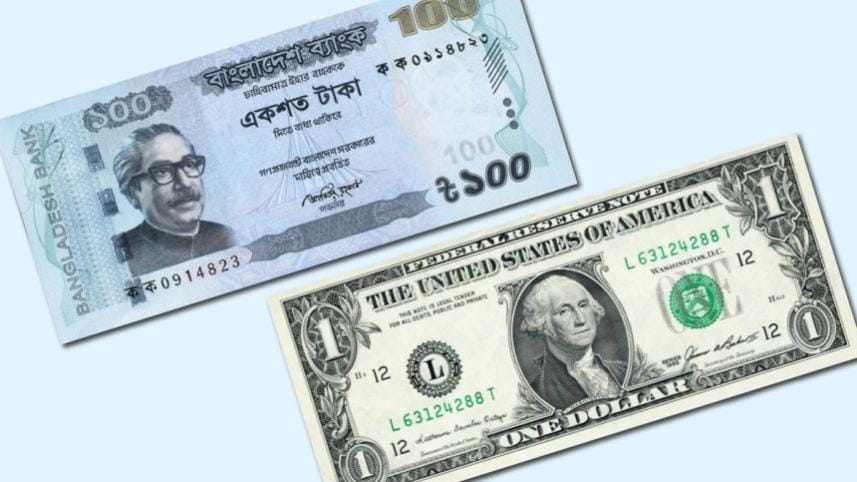Dollar-Taka: Market to dictate exchange rate once situation improves

The market will determine the price of the US dollar in the future once the current situation centring it improves, according to Bangladesh Bank Governor Abdur Rouf Talukder.
"We want a market-based dollar price and we will move towards it gradually," he said.
So, at one point the Bangladesh Foreign Exchange Dealers Association will take responsibility to set its rate with the taka, Talukder added.
The rate has been controlled by Bangladesh Bank for years but recent instability in the foreign exchange market has forced the central bank to substantially depreciate the local currency.
The Bangladesh Bank governor went on to say the rate depends on short-term inflows of remittance and export earnings and outflows of import spending. If there is a balance in the inflow and outflow, the rate becomes stable.
"We think the market is getting better," he said.
We want a market-based dollar price and we will move towards it gradually.
Talukder was responding to queries from journalists on the sidelines of the 9th Annual Banking Conference organised by the Bangladesh Institute of Bank Management (BIBM) at its premises in Dhaka.
He believes that a little bit of patience is needed if one wants to see the rate and inflation come down as fuel prices are still high in the international market.
"Patience is needed. If you tap one side, problems arise on the other. The current inflation is an import-induced one. The price of fuel dropped slightly, now it is rising again," Talukder said.
"As we meet 100 per cent of fuel demand with imports, it must impact inflation. Similarly, we also import fertiliser and the price of it is high. There is a shortage of wheat and we are trying to increase the import," he added.
However, Talukder did say there have been developments on this front.
"The World Bank says there is no possibility of a food shortage in Bangladesh while the International Monetary Fund says we don't need a bailout, which you [journalists] don't believe," he said.
He then said the credit rating agency Standard and Poor's recently maintained its long-term positive forecast for Bangladesh.
"So, the economy is on good course," the central bank governor said.
Banks should maintain ethical standards and morality while making a profit, said Talukder.
"Commercial banks must earn profits with their activities and in doing business, but one thing we shouldn't forget is that the country is above all and [banks] need to support the government."
According to him, banks and business entities do not make profits in the same way as banks have many responsibilities and have to maintain regulations.
It is essential for banks to demonstrate a good compliance culture to maintain their reputation and win the trust of the customers, investors and regulators.
As a regulator of banks, Bangladesh Bank has a keen interest in sound corporate governance and corporate culture, Talukder said.
The board of directors of banks should not engage in activities of the management and vice versa, and management should do business in accordance with regulations.
"With support from the government and central bank, our economy performed better than many of the neighbouring countries," he added.
Since the beginning of this year, supply chains have been substantially interrupted.
Bangladesh is dependent on the import of fuel, fertilisers and some food items and the country's imports have gone up manifold. Besides, import expenditure does not match with export earnings, he said.
"As a result, we feel pressure on our exchange rate and inflation rate. There were suggestions from different quarters to leave the cap on the lending rate."
"But if we leave the cap on interest rates at this point of time, that will increase the cost of entrepreneurs," he said.
"Rather, we are basically helping the entrepreneurs and also the bankers through supply-side intervention, both from the government and central bank," Talukder added.
Shah Md Ahsan Habib, chairman of the conference's organising committee, said in the context of Bangladesh, the inflationary surge tends to largely follow the trends in the movement of commodity prices in global and domestic markets.
The country's trade-centric foreign exchange market also came under stress in response to global developments. Furthermore, economic sanctions imposed on Russia have significantly undermined global trade and made the situation more complex.
"Although the Covid-19 situation has improved remarkably, economic recovery faltered due to these pressures. Inflationary pressures might create barriers to attain the goals and targets of the most recently passed budget by the national parliament," he said.
Habib said the challenging economic environment was having notable implications for the financial and banking sector.
In response to the situation, credit risks and non-performance on the part of borrowers increased, which created further pressure for maintaining a higher volume of provisions, and higher capital adequacy ratios.
"Necessity of good governance in the banking and financial industry was particularly felt in such a circumstance," he added.
Md Akhtaruzzaman, director general of the BIBM, Md Nehal Ahmed, member secretary to the conference's organising committee, Syed Mahbubur Rahman, CEO of Mutual Trust Bank, and Sarwar Uddin Ahmed, dean of academic affairs at Universal College Bangladesh, also spoke.



 For all latest news, follow The Daily Star's Google News channel.
For all latest news, follow The Daily Star's Google News channel.
Comments